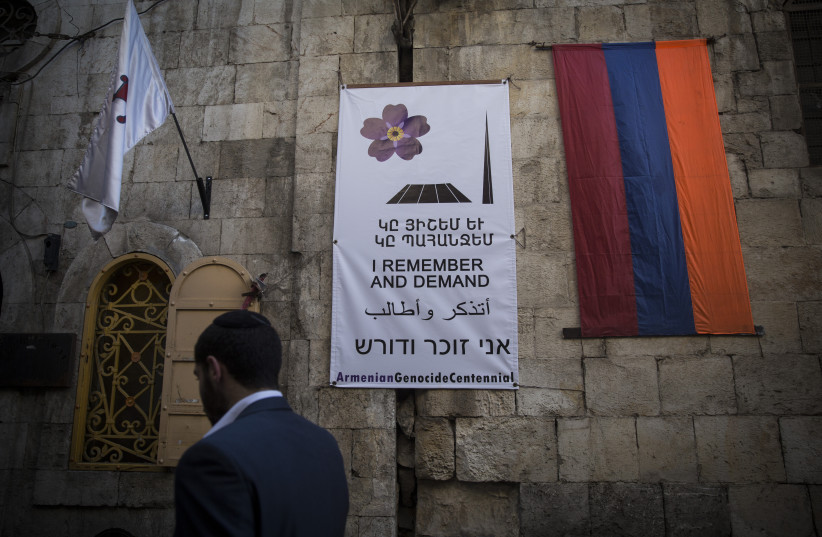On Sunday, Armenia marks 107 years since the Armenian genocide, in which between 600,000 to over a million Armenians were killed by the Ottoman Empire from 1915 to 1916.
In 1908, a group of Ottoman revolutionaries known as the Committee of Union and Progress (CUP), an organization within the Young Turks movement, came into power. The Young Turks aimed to modernize the Ottoman Empire and promote Turkish nationalism. Over time, the movement became suspicious of Armenians, accusing them of collaborating with foreign powers.
In January 1915, in the midst of World War I, the Young Turk government suffered a defeat at the battle of Sarikamish against the Russians and tried to shift the blame to Armenian treachery. Armenian soldiers were disarmed and transferred into labor battalions where they were then systematically murdered by Ottoman troops, according to the Encyclopedia Britannica. Irregulars began to carry out massacres of Armenian civilians in villages near the Russian border as well.
Turkish authorities used any instances of Armenian resistance as a pretext to employ harsher measures. In April 1915, Armenians in Van in eastern Turkey barricaded themselves in the city's Armenian neighborhood and fought back against Ottoman troops.
On April 24, 1915, about 240 intellectuals and leaders of the Armenian community in what was then Constantinople and other locations were arrested and deported by the Ottoman government. Most of those arrested were killed in the following months.

The Ottomans continued to expand the massacres and deportations, conducting marches of civilians to camps in desert regions in what is now northern and eastern Syria, northern Saudi Arabia and Iraq, according to the US Holocaust Memorial Museum.
Armenian civilians forced on the marches were exposed to arbitrary violence, including robbery, rape, abduction, extortion, torture and murder. Hundreds of thousands of Armenians were killed, abducted, committed suicide or died of starvation, dehydration, exposure or disease on the way to the holding camps.
Henry Morgenthau, the US ambassador to the Ottoman Empire, told the US State Department at the time of the massacres and persecution that "a campaign of race extermination" was being carried out by the Ottomans, writing afterwards "When the Turkish authorities gave the orders for these deportations, they were merely giving the death warrant to a whole race," according to a report by the US House of Representatives.
Talat Pasha, the main perpetrator of the massacres, told the newspaper Berliner Tageblatt that "We have been blamed for not making a distinction between guilty and innocent Armenians. [To do so] was impossible. Because of the nature of things, one who was still innocent today could be guilty tomorrow," according to RadioFreeEurope/RadioLiberty.
Raphael Lemkin, the Jewish lawyer who coined the term "genocide" and fought to make genocide punishable by international law, often said that early exposure to stories about the Armenian genocide was key to his beliefs about the need for legal protection of groups.
Turkey has long resisted attempts to recognize the massacres as genocide, despite widespread agreement by historians that the events do fit the definition of genocide. An overview by the Turkish Foreign Ministry acknowledges that a "tragedy" occurred to the Armenians, but claims that "no authentic evidence exists to support the claim that there was a premeditated plan by the Ottoman Government to kill off Armenians."
Last year, US President Joe Biden recognized the massacres of Armenians as genocide, sparking outrage from Turkey.
Despite being home to a large community of Armenian Christians, Israel has not yet recognized the mass murder of Armenians as genocide. After Biden's declaration last year, Foreign Minister Yair Lapid stated that he would "continue to fight for Israeli recognition of the Armenian Genocide; it is our moral responsibility as the Jewish state.”
Meretz MK Mossi Raz is set to take part in an anniversary ceremony in Armenia on Sunday. "The massacre of more than a million Armenians is one of the most horrific manifestations of human cruelty," said Raz on Saturday. "The time has come for Israel to remember those who perished and to tell their story. This is our duty as Jews and our duty as human beings. It is a great honor for me to represent the Knesset and Israel in this important position."
